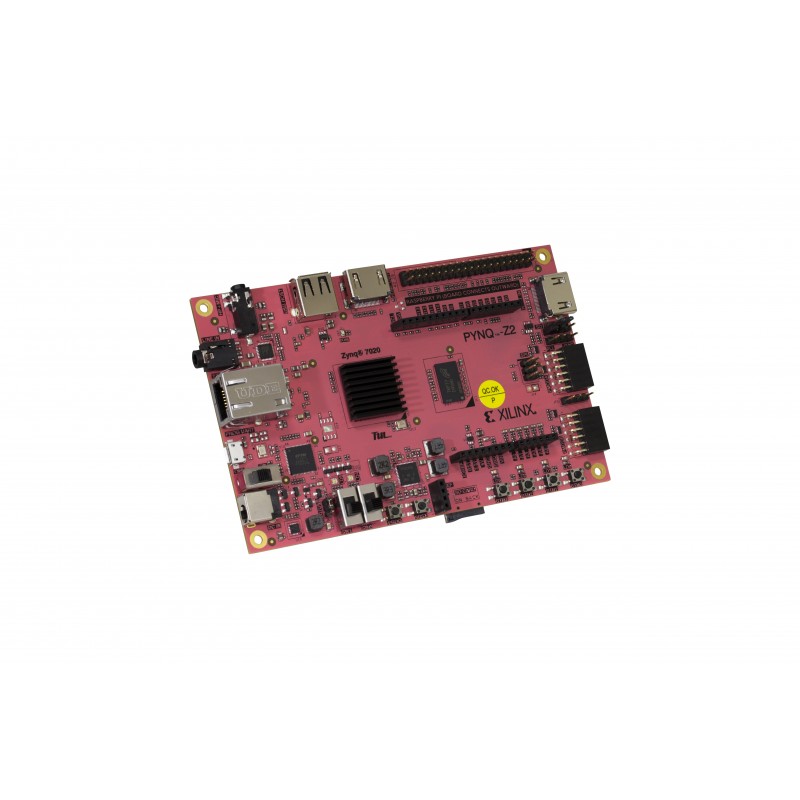




zł1,088.59 tax excl.
Development board FPGA with ZYNQ XC7Z020-1CLG400C system, built-in USB, audio / video interfaces, JTAG programmer and compatible connector Arduino UNO R3 and Raspberry Pi. The set works with the open-source PYNQ project that combines FPGA with Python. TUL PYNQ-Z2
Set PYNQ-Z1 is designed for use with a new, open-sourceową structure PYNQ , allowing developers to use the capabilities of SoC Xilinx Zynq (APSoC), without having to design programmable logic - instead, systems SoC are programmed using Python , and the code it is developed and tested directly on PYNQ-Z2. Logic circuits are imported as hardware libraries and programmed by the API practically in the same way as software libraries.
PYNQ-Z2 is a programmable FPGA board for embedded systems, natively supporting multimedia using audio and video interfaces on board. The board was designed to easily extend its capabilities using Pmod modules, Arduino shields, Raspberry Pi shields, Grove extensions, as well as using the shared GPIO ports. The possibilities of the PYNQ-Z2 can also be extended using USB devices - such as Wi-Fi cards, Bluetooth modules or cameras.
The board features a Zynq XC7Z020, Ethernet, HDMI in/out, MIC in, Audio out, Arduino Interface, 2 Pmods, 16 pin GPIO header, user LEDs, pushbuttons and Switches. 6003-410-0
FPGA development board with Spartan 6 chip and 16 Mb SPI Flash memory, 8 LEDs and buttons. Numato Lab FPGA002
No product available!
Development kit with Xilinx Artix 7 FPGA. Equipped with display, buttons, video outputs, Ethernet and microSD slot. Numato Lab NLFX1001
FPGA development board with Artix 7 chip and FTDI\'s FT2232H two-channel USB converter. Numato Lab NLFX1008
Development kit with Xilinx Spartan 6 FPGA. Equipped with display, buttons, audio and video outputs and microSD slot. Numato Lab FPGA006
No product available!
An FPGA development board with a Spartan 7 chip and a two-channel USB FT2232H converter by FTDI. Numato Lab NLFX1007
No product available!
FPGA development board with Xilinx Kintex-7 chip with 4 GB DDR3L SDRAM memory. Equipped with a fast PCIe interface. Numato Lab FPGA014A
No product available!
FPGA development board with Xilinx Kintex-7 chip with 4 GB DDR3L SDRAM memory. Equipped with a fast PCIe interface. Numato Lab FPGA014C
No product available!
FPGA development board with Xilinx Kintex-7 chip with 4 GB DDR3L SDRAM memory. Equipped with a fast PCIe interface. Numato Lab FPGA014B
No product available!
FPGA development board with Xilinx Artix-7 XC7A100T. Designed for a wide variety of applications. Numato Lab FPGA009-SS
No product available!
FPGA development board with Xilinx Kintex-7 FPGA chip with 4 GB DDR3L SDRAM memory. Equipped with a fast USB 3.1 interface. Numato Lab NLFX1004-A
No product available!
FPGA development board with Xilinx Kintex-7 FPGA chip with 4 GB DDR3L SDRAM memory. Equipped with a fast USB 3.1 interface. Numato Lab NLFX1004-B
No product available!
FPGA development board with Xilinx Kintex-7 FPGA chip with 4 GB DDR3L SDRAM memory. Equipped with a fast USB 3.1 interface. Numato Lab NLFX1004-C
No product available!
FPGA development board with Xilinx Spartan-6 FPGA. Designed for a wide variety of applications. Numato Lab FPGA008A-SS
No product available!
FPGA development board with Xilinx Spartan-6 FPGA. Designed for a wide variety of applications. Numato Lab FPGA008B-SS
No product available!
FPGA development board with Kintex 7 FPGA system and FT2232H two-channel USB converter from FTDI. Numato Lab FPGA010A-SS
No product available!
Development kit with the Xilinx Zynq XC7Z020 chip and the FT2232H dual-channel USB converter. Numato Lab FXZ001A-SS
No product available!

Development board FPGA with ZYNQ XC7Z020-1CLG400C system, built-in USB, audio / video interfaces, JTAG programmer and compatible connector Arduino UNO R3 and Raspberry Pi. The set works with the open-source PYNQ project that combines FPGA with Python. TUL PYNQ-Z2
